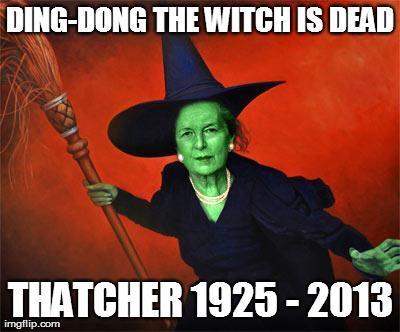The events of the last couple of days have highlighted to me how readily we view things from within our own silos, or bunkers. It also raises questions about how accurate the recording of history actually is, depending on who’s doing the recording, and what prejudices and beliefs they bring to that task.
We have seen Baroness Thatcher described variously as ‘wicked witch,’ and also as a ‘great Briton’; someone who changed Britain forever for the better, someone who is the source of much that is wrong in Britain today; someone who broke the glass ceiling for women (Barack Obama), someone who failed in her duty to help other women achieve (Janet Street-Porter), someone who was a potent advocate not for women but for individualism regardless of gender (Russell Brand). Irish Republicans hated her for her uncompromising approach, unionists praised it – before feeling betrayed themselves when she signed the Anglo-Irish Agreement. Some see the latter as a sell-out, others as paving the way for an IRA ceasefire and decommissioning by both Republican and Loyalist paramilitaries. Republicans accuse her of prolonging the ‘war’ on this island, some unionists hold that she brought the IRA to their knees, and forced them to the table to negotiate.
We have heard of those who are relishing the opportunity to dance on her grave, and we have heard her ideological foes Tony Blair and Martin McGuinness criticise celebration parties, including those in West Belfast and Derry. It is worth considering whether many of those doing the celebrating of her death (or of her life) have first hand experience of her government, or have accepted an inherited account of ‘truth.’ We have seen criticism of the taxpayer funding the cost (a substantial part of which will be security) of a ceremonial funeral with military honours, whilst others have highlighted that it’s a paltry sum in comparison to the £75 billion (& counting) rebate she achieved from Europe.
What is beyond doubt, and is undisputed objective truth, is that she won 3 successive general elections by the expressed wish of the majority of voters in GB. It seems that we have a choice – to criticise democracy as flawed and untrustworthy, or to accept that (like it or not) the policies and track record on which she was elected repeatedly met with the support of the majority of the electorate. It is hard therefore in objective terms to deny that she was a highly successful leader, but then the same could be argued for Hitler, so that doesn’t get us anywhere in determining net good versus harm.

She did come to power in the midst of much malaise and dissatisfaction due to people either not working (whether as a result of unemployment or numerous strikes – the latter also getting in the way of government ‘working’), or working but dissatisfied with their income and quality of life. She came to power on a manifesto which espoused the notion of individual responsibility, and just reward for hard work (but may not have shown sufficient compassion for those unable to). She was presumably seen by the electorate to offer better hope than the political alternatives at the time. However, many see her as wrecking manufacturing and employment in the UK, and depriving them of the ability to work. Not surprising therefore that there are such disparate views of her leadership. What I find interesting is that a majority which voted in favour of her policies, which included empowering The City and its bankers, turned into a majority that rushed to condemn bankers for their ‘go get it’ approach once its quality of life suffered as the result of recession.
It seems true that ‘without vision the people perish.’ We are hardly likely to benefit from leaders who are devoid of new ideas or who lack vision. Margaret Thatcher is quoted: “To me, consensus seems to be the process of abandoning all beliefs, principles, values and policies. So it is something in which no one believes and to which no one objects.” I can identify with that. The question of course is whether or not the vision is the right one. Still, many political leaders these days seem so dominated by fear of doing harm, and therefore are so risk averse (where risk is often how the media will present something) that they’re passive rather than prepared to act with calculated risk. There are also alternative risks eg that those who have authority (elected or otherwise) may impose ideological fixes that fix one thing at the expense of another. Denis Healey said of Mrs Thatcher:
“She approaches the problems of our country with all the one-dimensional subtlety of a comic-strip.”
Supporting unprofitable industry out of the public purse, with no sight of an end to such support, seems irresponsible and not for the long term good of either that industry or its employees; conversely killing UK manufacturing and its employment potential is hardly good for society, and clearly faith in banking/’The City’ to preserve economic wellbeing for all has proven to be misplaced faith.
In a model of leadership which I cherish, leaders are at their most credible when they themselves work hard to serve others.
Did we work for Maggie, or did she work for us? She may have had a ‘headful of ideas’ but were they good ones, or were they ones which just drove us insane?
It’s likely that we will never agree on the historical contribution of Margaret Thatcher but I figure it’s not all that important whether we do or don’t. There’s something else which is much more important.
Whatever our perspective, there is truth in David Ervine’s stolen soundbyte preserved on a mural in East Belfast:
It’s stolen from George Santayana (perhaps a distant relative of Carlos?), the American Philosopher, who coined it in his tome The Life of Reason (1905). But how can we possibly learn the lessons of history in the context of Thatcher, if we can’t agree on her merits/demerits? It has been argued that the Santayana quotation has been taken out of context – that it was more a suggestion regarding how knowledge is acquired than a moral obligation. Santayana also wrote “A man’s memory may almost become the art of continually varying and misrepresenting his past, according to his interests in the present.” Sounds like politics to me! I figure that the public memory of a man or a woman (history) can be the result of varying and misrepresenting his/her past, according to our perceived interests in the present. So perhaps we need to do an honest assessment of what our interests are, ie what motivates us, in order to prevent us misreading/misrepresenting any leader’s contribution.
Those who feel threatened, or deprived, or inappropriately unrewarded, tend to focus on a call for ‘justice’ which is often code for ‘retribution,’ and may have less room for compassion for those who are deemed ‘unworthy,’ and may favour leaders who endorse those feelings. It could be argued that this is what the electorate did in electing a party whose leader has been accused of lacking compassion. Dare we take a step back each time we go to the polls and ask ourselves what is our motivation, and is it for the common good, or for our own benefit?
We need to look deeper, beyond Margaret Thatcher. To reach the real truth of the matter, and to learn from history, we need to look at why someone known as The Iron Lady had such historic electoral success. Whether we are those who voted for or against her, or received post-hoc indoctrination from our elders, that will inevitably require us to look closer at ourselves as electors and what motivates us…









Slicer. Well crafted entry, isn’t it rather chilling to realise that we seem to be in the middle of the same debate in today’s Britain. The current government is possible more Thatcherite than Maggie was.
Thanks David. Yeah, it’s left me wondering whether, if Maggie had been allowed to continue in power, she would have unpicked the NHS as a function/duty of the state the way this government seems intent on doing. There are likely lots of down sides to government by coalition, but I dread to think where we’d be on some issues if there was not some reining in of Tory objectives by the LibDems.